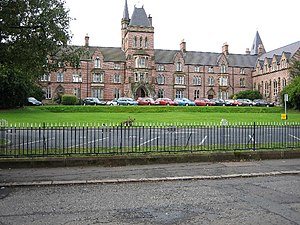| "Methody" Methodist College Belfast. Once again, Northern Ireland pupils obtained better results than their counterparts in England and Wales. (Photo credit: Wikipedia) |
Grades have fallen for the second year in a row with 68.1% of exam entries being graded between an A* and a C - a fall of about 1.3% on last year. In maths, the fall was 0.8 percentage points from 58.8% to 58%.
The overall proportion getting the top grades A* or A fell from 22.4% to 21.3%. And the overall pass rate also fell marginally, for the first time since the GCSE exam was introduced 25 years ago.
One factor that may have contributed to the drop in grades is the increasing trend for schools to enter pupils for certain GCSEs - particularly maths and English - one or even two years early. The JCQ have criticised this approach, claiming that pupils are missing out on the chance to gain better grades - and on the extra years of learning.
In addition, there is a trend for pupils to be entered for more than one exam in the same subject, whether it be for different boards or different tiers. There has also been a marked increase in the number of pupils taking the IGCSE, as well as the traditional GCSE. In these ways pupils can take the best result, but the overall statistics are skewed downwards.
Critics say that these trends are a result of schools chasing places in league tables, including the new English Baccalaureate, which rates schools on the number of pupils getting good GCSEs in a range of core subjects.
There was a big fall in pupils getting top grades in the science subjects, following the introduction of new syllabuses and exams.
Brian Lightman, head of the Association of School and College Leaders, said that schools, students and teachers are working hard in a constantly changing and turbulent environment. He also pointed out that piecemeal changes to the exam system make it impossible to compare grades from one year to the next.
Last year the grading of the English GCSE resulted in a legal challenge by some schools, when the grading standards were deemed to have changed between the January and June exams.
Only in Northern Ireland was there a rise in grades. A total of 28% of entries were graded A or A*, compared with 21.2% in England.
With the modular system soon to be scrapped in England, Northern Ireland still has to decide whether or not to continue with modules, or follow England's lead with a single end-of-course exam. Wales has already decided to continue with a modular system for GCSEs.

